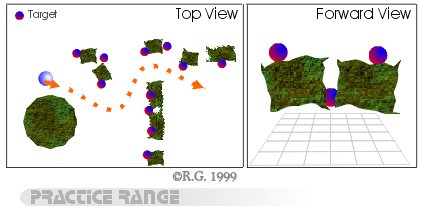| Target
Practice
To effectively use a water weapon, one must be familiar with its rate of fire, stream behaviour, rate of repressurization, etc. In the end, what matters is how quickly one can arm the weapon and unleash a volley of water at an intended target. The more one uses a weapon, the more familiar one will be with the weapon's characteristics. Every weapon is a little different and takes some time to learn how to use well. During off-time (i.e. when a water war is not raging), practicing using one's weapon of choice is highly suggested for honing one's skills with it.
TARGET PRACTICE RANGE: An area away from civilians should be chosen and set-up for a practice range. The above diagram is a sample of a hypothetical practice range. Targets of varying sizes should be set up alone a given trail at varying heights and positions. The total number of targets should be known. Then, the one who is up for practice should make their way through the firing range along a set path as quickly as possible while shooting down as many targets as seen. Skill is determined by looking at how many targets were found, successfully knocked over by water, amount of water used, and time it took to complete the course. As one improves, less water should be used, more targets should be found and knocked over all in a shorter period of time. This type of firing range will give one a good handle and understanding of the weapon one has chosen to use. The main problem with the firing range is that it tests one's ability on stationary targets. Moving targets are harder to hit, but cannot be adequately mimicked using cheap materials. One's best hope here is to find a friend who is willing to "practice" at aiming and dodging streams of water. |
 TARGETS:
Unless one has a willing and available... err.. victim, inanimate targets
are the next best thing to practice one's aim on. Good objects to use
as targets need to be water proof, yet easily knocked over if hit such
that accuracy can be determined. However, the target should not be too
easy to knock over to ensure a direct hit has been achieved. One good
type of target is a round can or container lid mounted upright on a
small block of wood or plastic. The materials are usually easy to find,
not expensive and simple to put together. This is important since one
needs many of these to make a good practice range. The smaller the lid
used, the more challenging the target is to hit. As such, varying levels
of difficulty can also be achieved and a group member's skills can be
put to increasingly more difficult tests during non-combat times.
TARGETS:
Unless one has a willing and available... err.. victim, inanimate targets
are the next best thing to practice one's aim on. Good objects to use
as targets need to be water proof, yet easily knocked over if hit such
that accuracy can be determined. However, the target should not be too
easy to knock over to ensure a direct hit has been achieved. One good
type of target is a round can or container lid mounted upright on a
small block of wood or plastic. The materials are usually easy to find,
not expensive and simple to put together. This is important since one
needs many of these to make a good practice range. The smaller the lid
used, the more challenging the target is to hit. As such, varying levels
of difficulty can also be achieved and a group member's skills can be
put to increasingly more difficult tests during non-combat times.